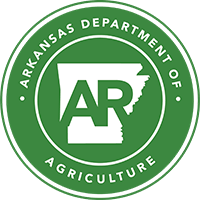Plant Industries
Serving the citizens of Arkansas and the agricultural and business communities by providing information and unbiased enforcement of laws and regulations set by the Arkansas State Plant Board
Enforcement
Seed Enforcement Overview
The ultimate purpose of seed laws and regulations is to protect the consumer and seedsman from poor quality or mislabeled planting seed. This is primarily achieved through routine audits of seedsmen, and field inspectors policing the areas where agricultural seed is sold. The inspectors make sure that all the seed, which is being offered for sale, has a label. The label provides information for the buyer such as the germination potential, the kind and number of noxious weeds per pound, the % other crop, the % weeds, the % inert material present, etc., as well as the seed labeler’s name & address. The seed labeler or distributor is responsible for compliance with Arkansas’ laws and regulations on the sale or distribution of planting seed. Violations (after an appropriate investigation) will activate the Seed Enforcement Response Policy. Violations are categorized as minor or major. The enforcement response for major violations may include civil penalty fines.
Violations are recognized through: A) Routine compliance monitoring or B) Complaints from individuals on suspected violations. All suspected violations are investigated by Plant Board staff to determine if a violation has occurred and then to determine the appropriate enforcement action.
Routine Compliance Monitoring
- The inspectors take random samples of the seed that is being offered for sale and send them, along with copies of the labels, to the seed laboratory. The seed is tested and compared with that on the label. If the seed analyst's findings are out of tolerance with the label, the seed is considered to be mislabeled. A Stop-Sale Notice is issued which prevents the seed from being sold until it has been released to show the correct information, sold for oil or feed (must be untreated), or returned to the manufacturer.
Stop-Sale Notices are also issued by field inspectors or other Plant Board staff because of technical violations, such as: no analysis labels on the seed; insufficient information on the label; offering seed for sale without an Arkansas Seed Dealer's license; etc. A list of licensed companies and Individuals currently selling seed or offering seed for sale in Arkansas is maintained at the Plant Board Seed Division office.
All Stop-Sale Notices, whether issued by the Division Director, Auditors, or by the Field Inspector, must have a written release issued by the inspector after he/she is satisfied appropriate measures were taken to correct the violation. Investigation of the violation may reveal a need for further enforcement action. - Random compliance audits are made by Plant Board auditors. Audits that reveal alleged violations activate the investigation process.
- The Federal Seed Act regulates seed in interstate commerce, requiring proper labeling and prohibiting misrepresentation of seed transported from one state to another. By agreement between State and Federal authorities, randomly selected regulatory seed samples of interstate shipments are sent to the USDA Federal Seed Laboratory to be grown in varietal test plots. The Federal Seed Branch will request records on any seed found to be mislabeled as to variety. An investigation is made to determine who is responsible for mislabeling. Upon findings of the investigation, appropriate action is taken which can range from a warning letter to a penalty assessment.
Information from Individuals on Suspected Violations
All information regarding alleged violations is subjected to thorough investigation by Plant Board staff to determine if a violation has occurred. The investigation may involve surveys, audits for seed tonnage or final disposition of certified seed, on-site inquires by Plant Board inspectors, etc. This documentation is compiled by the Seed Division staff and reviewed by the Case Development Review panel to determine the appropriate enforcement action.
Contact us: regulatoryseed@agriculture.arkansas.gov
- Arkansas Licensed Seed Dealers (92.42 KB)

